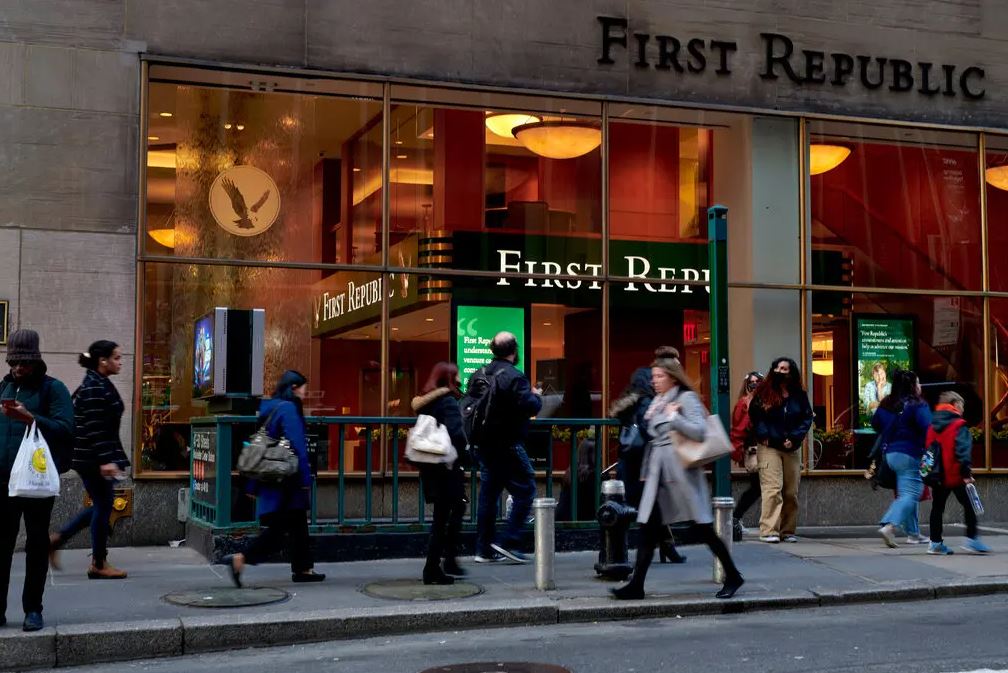After the financial crisis that hit the United States last month, First Republic Bank was the most threatened institution. On Monday, the bank revealed the gruesome specifics of how bad its company has become.
The bank’s officials offered nothing in their first report to investors since the stock price began a precipitous decline a month and a half ago. Investors and the general public were left with little clues about how the bank planned to escape its crater after its leadership spent just 12 minutes on a conference call to discuss its first quarter results with Wall Street analysts and refused to accept questions.
“When a bank feels like it has few options left, it starts to play by its own rules,” said Timothy Coffey, a bank analyst at Janney Montgomery Scott. They’re going to have to battle every day, every week, for the foreseeable future.
The fate of the bank, which serves affluent clients on the coastlines, seems to be in the balance. Even with the temporary $30 billion lifeline it got from the nation’s top banks last month, it lost a startling $102 billion in client deposits during the first quarter, much over half the $176 billion it possessed at the end of last year.
To make up for the loss of deposits, the bank took out loans totaling $92 billion over the same time period, most of which came from the Federal Reserve and other government-backed lending agencies. That’s a risky move for any bank, as they make their money by borrowing from their customers at low interest and lending it back to them at much higher rates.
Despite the decline, First Republic is still profitable, reporting a quarterly profit of $269 million. In line with the banking sector as a whole, it made a lot fewer loans than it had in previous quarters as executives fretted about a potential recession and falling house values and sales.
After bank management refused to answer questions from analysts, the stock price fell by roughly 20% during extended trading.
Since mid-March, First Republic’s share price has dropped by more than 85%.
The bank reported that the withdrawal of deposits slowed or stopped altogether in the final week of March. The bank said that between March 31 and April 21, just 1.7% of their deposits were lost, and that the majority of these withdrawals were due to customers making tax payments.
About six weeks ago, the decline started when clients of smaller lenders Silicon Valley Bank and Signature Bank withdrew billions of dollars, prompting federal officials to seize the banks. San Francisco-based First Republic was generally considered to be the next in line to fail because, like Silicon Valley Bank, it served a large number of start-up businesses, and many of its customers had deposits in excess of $250,000 that were not covered by federal deposit insurance.
Financial advisors and government officials have been meeting with First Republic to discuss potential rescue options, such as selling the bank or sections of it, or raising additional capital.
There is still a long way to go. On Monday, the financial institution said that it will reduce its workforce by as much as a quarter and reduce CEO salary by an undisclosed amount.
First Republic was seen as a top stock for quite some time. Jim Herbert, who is now 78 years old, created the bank in 1985 and serves as its executive chairman. In contrast to the government-backed mortgage giants Fannie Mae and Freddie Mac, the firm stood apart by providing jumbo mortgages to the rich. Mr. Herbert always defended First Republic’s business strategy by saying that the company’s debtors had excellent credit.
Merrill Lynch acquired the bank in 2007 for $1.8 billion. However, their control of the institution lasted barely three years. After the financial crisis of 2008, Mr. Herbert and several other investors acquired the bank back and brought it public.
Since then, First Republic has prioritised growth by opening new branches in affluent neighbourhoods in New York City, Boston, San Francisco, and Los Angeles, as well as in Greenwich, Connecticut, and Palm Beach, Florida. Warm, freshly made cookies were only one example of the way the bank’s branches won over current and potential new ones.
Janna Koretz, a 37-year-old psychologist in Boston, has been a customer of First Republic Bank for the better part of a decade, ever since she began establishing her own practise. She emphasised, “It’s not like I had all this money,” but her banker was always ready. The bank would sent messengers to her workplace to retrieve funds.
Hundreds of staff and customers were reportedly invited to a Christmas party held by the bank in the middle of December at a performing arts facility in Manhattan, according to two guests who spoke on the condition of anonymity in order to protect their ties with the bank. The gathering was delighted by a graffiti artist who sprayed with black spray paint and flamenco dancers. Mike Roffler, the bank’s chief executive since March 2022, predicted that 2023 will be a difficult year for the institution.
After three months, the bank was once again in the limelight, but for a different reason. Many bigger banks considered purchasing First Republic in the days and weeks after the collapse of Silicon Valley Bank. When an agreement couldn’t be reached, JPMorgan Chase CEO Jamie Dimon and Treasury Secretary Janet L. Yellen coordinated a $30 billion cash infusion. The large financial institutions who contributed the capital will have access to it within four months.
Mr. Roffler did not provide any insight into potential future steps during Monday’s short conference call, instead reiterating the bank’s previous statements. For their dedication to First Republic and their continued service to our customers and communities during this trying time, he remarked, “I’d like to take a moment to thank our colleagues.” Their hard work is quite admirable.
